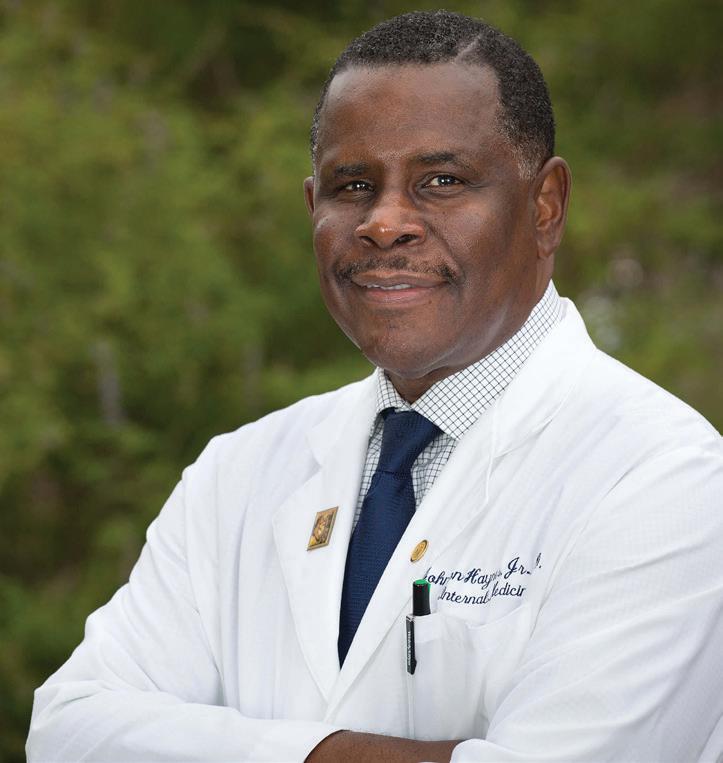
2 minute read
USA Comprehensive Sickle Cell Center named for Johnson Haynes Jr., M.D.
In recognition of his longstanding commitment to the treatment, research and education of sickle cell disease, the University of South Alabama Board of Trustees authorized the naming of the USA Comprehensive Sickle Cell Center as the Johnson Haynes Jr., M.D., Comprehensive Sickle Cell Center at their September 2022 meeting.
Haynes, a longtime, well-respected member of the University of South Alabama community, died Dec. 2, 2022. In addition to serving as director of the Comprehensive Sickle Cell Center since 2001, Haynes was a professor of internal medicine at the Whiddon College of Medicine, assistant dean of the Office of Diversity and Inclusion, and a pulmonologist with USA Health.
Advertisement
“Dr. Haynes has cared for most of the adults with sickle cell disease in the southern half of Alabama,” John V. Ma- rymont, M.D., M.B.A., vice president for medical affairs and dean of the Frederick P. Whiddon College of Medicine, said at the trustees meeting. “His dedication to this community is unsurpassed. It is an honor to name the center that means so much to so many after him.”
A 1980 graduate of the Whiddon College of Medicine, Haynes completed a residency in internal medicine and a fellowship in pulmonary medicine with USA Health. He joined the faculty in 1984 as the first Black clinical and basic sciences faculty member.
Following Haynes’ passing, Ardie Pack-Mabien, FNP-BC, stepped in to lead as the interim director of the Johnson Haynes Jr., M.D., Comprehensive Sickle Cell Center. She has served as a nurse practitioner at the center since 1997.
Memorial gifts will benefit the Johnson Haynes, Jr., M.D. Comprehensive Sickle Cell
Center. Donations can be made online at giving.usahealthsystem.com/haynes.
USA awarded $5.45 million to enhance Primary Care Pathway program
With the goal to increase the number of primary care physicians in rural and medically underserved communities and ultimately improve the health of those populations, the Whiddon College of Medicine received $5.45 million from the Health Resources and Services Administration to expand and enhance its Primary Care Pathway (PCP) program.
This award supplements a grant the Whiddon College of Medicine received from HRSA in September 2019. The initial grant, plus all supplemental funding, now totals $19.8 million.
Launched in July 2020, the PCP program is based on standards set forth by the Brain Attack Coalition and the American Stroke Association, and it affirms that the medical center addresses the full spectrum of stroke care – diagnosis, treatment, rehabilitation and education –and establishes clear metrics to evaluate outcomes. is an educational track that provides medical students with four years of specialized training in primary care. The Primary Care Pathway Scholars are selected based on an interest in primary care and a willingness to commit to the practice following residency training. The program enrolls up to 10 students per class, for a total of 40 PCP Scholars.
“We provide tuition assistance, clinical, research and educational experiences in federally qualified health centers with the ultimate goal to have them enter into a primary care discipline and practice in an underserved environment,” said Allen
USA Health OB-GYN helps expand care in rural Alabama USA Health is working with Franklin Primary Health Center to fill the healthcare gap in women’s primary care in rural Alabama. They are launching the area’s first OB-GYN and women’s health clinic in Evergreen. The collaboration will enable women to take part in “whole person care,” which integrates physical, mental and reproductive health for women and their families.
Perkins, M.D., M.P.H., professor and chair of family medicine and principal investigator of the project.
Perkins said the supplemental funding will enhance the educational environment of the five community health centers in which the students learn and work, as well as support full-time and community-based faculty to provide these experiences.
They also will provide space in the simulation lab for simulated patient encounters focusing on underserved and disadvantaged populations, which all medical students will be exposed to in the curriculum.
Students collect menstrual products for those in need
Members of the OB-GYN and Jags Against Trafficking stu- dent interest groups collected thousands of menstrual products for underserved women in the community. Donations totaled about 3,500 pads and liners, 2,000 tampons, 3,500 sanitary wipes, 500 pairs of underwear/diapers, 50 menstrual cups and more. The students distributed the products










